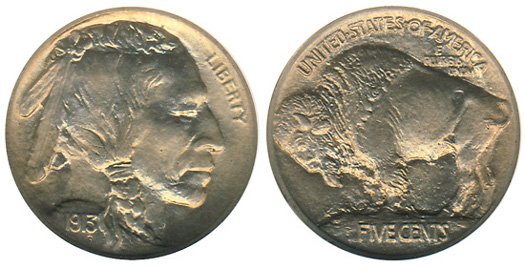Guide to U.S. Buffalo Nickels
The Buffalo Nickel, or Indian Head Nickel, was introduced in 1913 and struck each year until 1938. The series has been a long-time favorite of coin collectors due to the uniquely American images featured within the design. Created by noted sculptor James Earle Fraser, the obverse carries a portrait of a Native American chief based on three real life models. The reverse carries the image of an American Bison, or “buffalo,” believed to have been modeled after Black Diamond from the New York Central Park Zoo.

The introduction of the Buffalo Nickel had continued efforts started by President Theodore Roosevelt to improve the artistry and beauty of United States coinage. Roosevelt had hired sculptor Augustus Saint-Gaudens to redesign all eligible circulating coins, however Saint-Gaudens passed away after completing new designs for only the eagle and double eagle. Roosevelt would enlist other artists to redesign the quarter eagle, half eagle, and cent. After his administration, the process would continue with the remaining circulating denominations.
James Earle Fraser
James Earle Fraser, who had been an assistant to Saint-Gaudens, was commissioned in 1911 to create the new design for the nickel. He created a number of concepts and patterns, including one featuring Abraham Lincoln. Ultimately, designs featuring a Native American and buffalo were favored and approved, although production was delayed due to objections from the manufacturer of an anti-counterfeiting device for vending machines. In order for its devices to continue to work properly, the manufacturer demanded a flatter cheekbone and a clear space around the rim. After months of delays and negotiations, the demands were rejected and the Buffalo Nickel was produced and released in early 1913.
Obverse Design
The obverse design features the right-facing portrait of a Native American chief. Fraser based the image on Two Moons from the Cheyenne tribe, Iron Tail from the Sioux, and John Big Tree from the Kiowa tribe. The composite image was intended to represent a type, rather than an actual person. The inscription “LIBERTY” appears against the rim at the top-right of the coin, while the date appears on the truncation of the neck. Beneath the date, the designer’s initial appears as a small incuse “F.” The placement of the date on a raised area of the design caused it to wear heavily in circulation, creating many “dateless” Buffalo Nickels.

Reverse Design
The reverse design of the coin was produced in two distinct types. The original 1913 Type 1 Buffalo Nickel design was produced for only a short period during the first year of issue in 1913. A male North American bison, commonly called a buffalo, appears standing on a raised mound containing the denomination expressed as “FIVE CENTS.” The inscription “UNITED STATES OF AMERICA” appears around the upper edge of the coin, with the motto “E PLURIBUS UNUM” placed in three lines beneath.
Soon after the first Buffalo Nickels were struck, it became apparent that the area of the coin containing the denomination would wear quickly in circulation. The inscription had been placed on the highest point of the coin, which over time would have allowed it to wear away completely. Modifications were made by Charles E. Barber, who had previously expressed strong criticism of the design.
Type 2 Design
The revised or Type 2 design would have the overall relief lowered, the ground beneath the bison flattened, and the denomination placed within a recessed area to protect it from wear. No modification was made to the placement of the date, which remained on a raised area of the design. This type was introduced part of the way through 1913 and used without further significant modification for the duration of the series.
Mintage levels for the Buffalo Nickel ranged from a low of 970,000 pieces to a high of more than 100 million. There are no significant key dates, however many issues are exceedingly difficult to locate in gem condition. The series does contain several popular varieties, including a rare 1916 Doubled Die Buffalo Nickel and the famous “three legged buffalo” variety.

